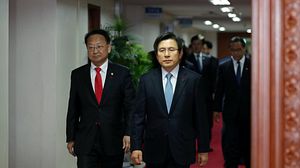South Koreans breathed a collective sigh of relief following the impeachment of President Park Geun-hye on December 9.
For many here, the ouster, spearheaded by massive demonstrations, offers hope of a change in a country where politics and big business are plagued by corruption. But it’s unclear which direction the country will take if and when Park is removed from the Blue House.
The country’s Constitutional Court will decide within the next six months to approve or reject the impeachment vote against Park, who’s accused of violating the constitution in a scandal with allegations of abuse of power and extortion.
Until that decision, an interim government will run the country, led by acting President and Prime Minister Hwang Kyo-ahn, an unelected official seen by critics as a Park loyalist. He has to lead South Korea in uncertain times amid slowing economic growth and a strengthening North Korean military threat.
“I think generally we see greater public expectation for his activism, doing all he can to make sure the government functions properly while politics is in turmoil,” said Kim Byoung-joo, the head of strategic consulting firm KL&P in Seoul.
However, many South Koreans are leery of Park’s No. 2 official, and protesters are expected to pack the streets again this weekend to call for his resignation and keep pressure on the president.
According to the Associated Press, Hwang even took responsibility for the scandal, saying he’s “sincerely sorry to the people.”
For now, he’s acting with the full powers of the president, and he made national security his top priority in his first week on the job. He told the Joint Chiefs of Staff in Seoul to “maintain a solid security posture” against North Korea, according to the Korea Herald.
Since the scandal broke in October, North Korea hasn’t made any military threats. Bruce Bechtol, who’s published numerous books on North Korea’s leaders and military, said Pyongyang’s silence is unsurprising.
“The North in times of crisis of South Korea has never ended up attacking during those time periods,” said Bechtol. “What largely makes the North’s asymmetric strategy so uniquely threatening is they attack or cause provocations when you’re least expecting them.”
But never say never, Bechtol said. He believes North Korea may be waiting for around the time of the U.S. presidential inauguration to provoke its enemies and send a message to Washington.
James Kim at the Asan Institute for Policy Studies in Seoul adds the security front won’t be a major challenge for Hwang as long as “North Korea stays quiet.”
First, Kim said, Hwang needs to address the economy.
“There are several things on the economic front that he needs to do to make sure South Korea doesn’t go into a tailspin on that front,” said Kim.
The U.S. Federal Reserve just raised its key interest rate, which sent financial officials in Seoul scrambling to prevent market volatility, according to the Herald.
And in a step to maintain policy continuity, Reuters reports, Hwang retained Finance Minister Yoo Il-hoo after Park attempted to replace him last month, ahead of her impeachment.
Despite investors’ concerns over South Korea’s political uncertainty, Fitch Ratings doesn’t expect the crisis to impact economic activity for a prolonged period.
Long before the scandal that sunk Park, she faced widespread criticism over her economic policy. Shin Se-don, a professor of economics at Sookmyung Women’s University, tutored the president. He summarized her economic policy to local broadcaster TBS in three words: aimless, ruthless and fruitless.
“Economic growth has been worse than any other government in modern Korean economic history,” Shin told TBS.
It’s in that light that Kim of KL&P disagrees with people he said fret about the economy in the absence of the president.
He suggested there’s a sense of relief in South Korea that anything is better than Park.

































